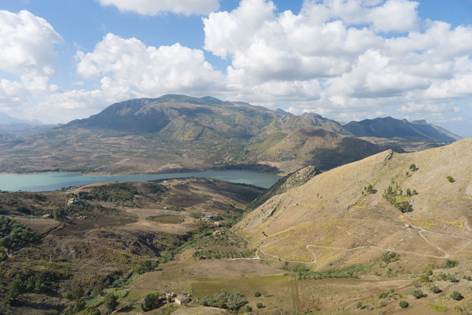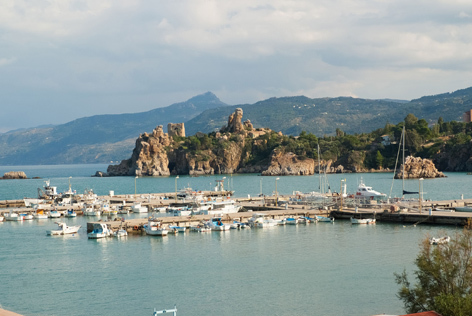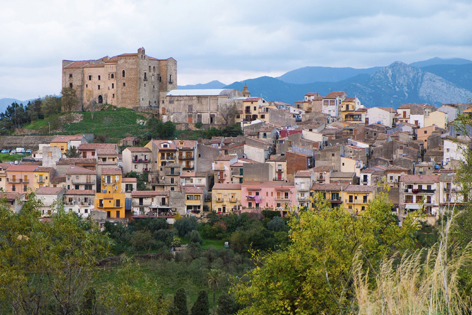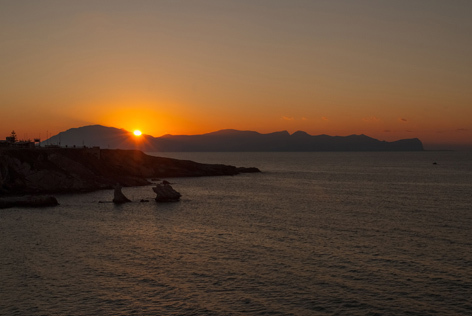Sicily may be famed for its Mafia connections, but we discover a family-friendly island trying to break free of its past
I meet my guide Erme Riccobono at the entrance to the Teatro Massimo, the majestic Palermo opera house where the last scene of The Godfather Part III was shot nearly 25 years ago.
The Italian holiday island of Sicily may have been ruled by the Mafia for decades, but things are changing as locals increasingly refuse to pay pizzo (protection money), while anti-Mafia organisations show visitors how to see this sun-kissed hotspot without filling the coffers of the mob.
Erme is a guide for one such organisation, Addiopizzo, set up by a group of student friends 10 years ago in the capital, Palermo.
They put up posters anonymously throughout the city and then secretly collected signatures from consumers who wanted to support shopkeepers who were refusing to pay pizzo.
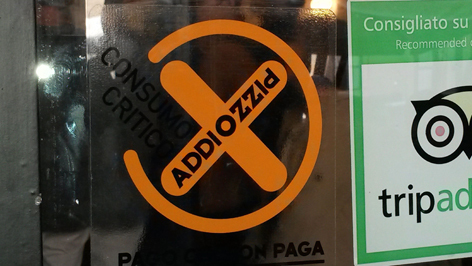 We weave our way through the narrow streets to find a mixture of splendour and squalor, where historic monuments rub shoulders with darker, seedier-looking streets housing an eclectic mix of outlets.
We weave our way through the narrow streets to find a mixture of splendour and squalor, where historic monuments rub shoulders with darker, seedier-looking streets housing an eclectic mix of outlets.
These range from high class patisseries selling cassata siciliana – the sickly sweet gateau filled with ricotta cream and decorated with candied fruit and martorana (‘fruit’ made out of marzipan) – to tacky souvenir shops selling sinister memorabilia, a black-humoured nod to the Mafia.
T-shirts imprinted with Marlon Brando’s face along with the film’s memorable logo and puppet string imagery grace the entrance to several souvenir shops. “This is the sort of thing we want to discourage,” says Erme.
He leads me to a more charming square, home to Antica Focacceria San Francesco, an Addiopizzo member, its membership sticker boldly emblazoned on its door.
The restaurant is famous in Palermo for its upmarket street food and I tuck into delicious arancini – rice balls filled with meat and peas – while others nibble on panelle (chickpea fritters), or enjoy a vegetarian staple of caponata (a stew of aubergines, onions and olives).
Addiopizzo’s motto is that, ‘People who pay the pizzo (protection money) are people without dignity’. From their small beginnings 10 years ago, today almost 900 shops and businesses refuse to pay pizzo in Palermo, while others are keen to stop paying, Erme tells me.
He shows me round some other notable landmarks, including a memorial to the famous anti-Mafia judges who were murdered in Palermo (including Giovanni Falcone and Paolo Borsellino), Capo Market, where paying protection money has been a well-worn tradition among stallholders.
Erme says it will be new generations, those who have not grown up in the shadow of Cosa Nostra who will make the real change.
To this end, Addiopizzo has a new arm, www.addiopizzotravel.it, which runs Mafia-free trips for tourists, incorporating a list of hotels and businesses who refuse to pay pizzo, which tourists can access to ensure their money is being channelled responsibly.
Away from the glory and the grime of the capital is a much calmer, more serene setting in Lascari, a little village in the hills about 20 minutes’ drive from the popular seaside town of Cefalu in the north of the island, where we are based in a beautiful luxury villa, which boasts a magnificent view of the coast.
The advantage of staying near family-friendly Cefalu is that, if we want to ditch the car for a day, we can catch a train from Cefalu to Palermo and be there in an hour, or Messina, at the tip of the north east of the island, in two. The trains are cheap, reasonably comfortable and the timetables are easy to follow.
But a hire car gives you more independence, especially if you’re in the hills of Lascari, where public transport is hit and miss and the terrain is hard on foot, unless you’re a seasoned hiker.
Driving up the hills, we pass olive and lemon groves, spiky prickly pears and purple morning glory weaving in and out of the wind-scorched conifers, which line our route to our hillside haven, Villa Elisabetta, in the Madonie National Park.
Equipped with all the wonderful amenities of any top notch hotel – spacious pool, loungers, air con, brilliantly equipped kitchen – it’s the view of the coastline which steals the thunder.
With the luxury of a car, you can visit plenty of ancient sites, from the Roman ruins at Enna to the castles and cathedrals further afield, not to mention the volcano, but it’s a large island and we’re too far from the famous Mount Etna for a day trip.
The beach at Cefalu is an ideal place for all generations, as youngsters try their hand at surfing and canoeing in the warm sea, or peruse the beachfront stalls while older culture vultures venture up to the gothic 12th century cathedral, or Duomo, and to the numerous museums in the town.
West of Cefalu, we find the ruins at Solunto, a wild location set on impressive cliffs and one of the earliest Phoenician trading posts on the islands, but there are many other more extensive ruins elsewhere, including the Valley of the Temples in Agrigento in the west.
On another day, we drive inland from Lascari, through the foothills of the Madonie mountains, coming across a pretty town called Castelbuono, which houses an impressive 15th century feudal castle, busy old-fashioned streets and welcoming hostelries.
It’s difficult to believe the island still harbours such a strong Mafia influence – but with a new generation, we may eventually see a Sicily that says Addio to the mob.
TRAVEL FACTS
Hannah Stephenson was a guest of CV Villas (www.cvvillas.com; 020 7563 7902) who offer a week’s stay at Villa Elisabetta for up to eight guests from £2,640-£3,430 per week, including maid service and a welcome pack. Prices for flights, including UK regional departures, and car hire also available on request.
For more information on Mafia-free tours, hotels and businesses, go to www.addiopizzotravel.it
Travel search site Skyscanner (www.skyscanner.net) offers Palermo car hire from £16 per day. Download its driving abroad guide (with tips, local laws and speed limits) to Italy at www.skyscanner.net/news/driving-abroad-guides
